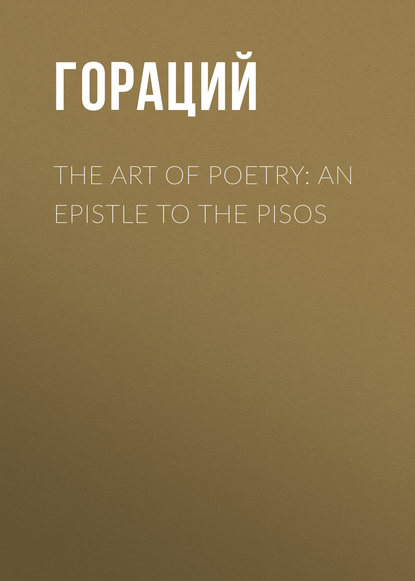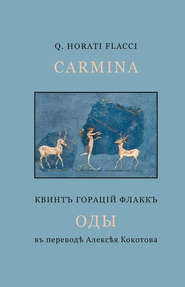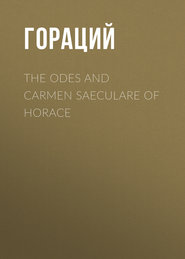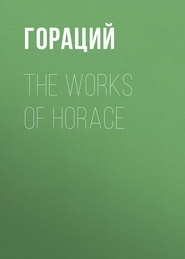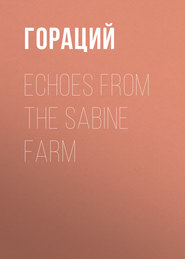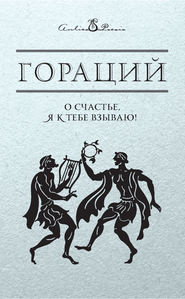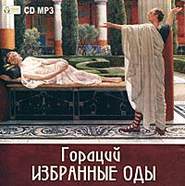По всем вопросам обращайтесь на: info@litportal.ru
(©) 2003-2024.
✖
The Art of Poetry: an Epistle to the Pisos
Настройки чтения
Размер шрифта
Высота строк
Поля
Which though sometimes behind a cloud retir'd,
Breaks out again, and is the more admir'd.
The following lines of Pope may perhaps appear to bear a nearer resemblance this passage of Horace.
Some to Conceit alone their taste confine,
And glitt'ring thoughts struck out at ev'ry line;
Pleas'd with a work where nothing's just or fit;
One glaring chaos, and wild heap of wit.
Essay on Criticism.
49.–Of th' Aemilian class ] Aemilium circa ludum—literally, near the Aemilian School; alluding to the Academy of Gladiators of Aemilius Lentulus, in whose neighbourhood lived many Artists and Shopkeepers.
This passage also is imitated by Buckingham.
Number and Rhime, and that harmonious found,
Which never does the ear with harshness wound,
Are necessary, yet but vulgar arts;
For all in vain these superficial parts
Contribute to the structure of the whole
Without a Genius too; for that's the Soul:
A Spirit which inspires the work throughout
As that of Nature moves the world about.
Essay on Poetry.
Pope has given a beautiful illustration of this thought,
Survey THE WHOLE, nor seek slight faults to find
Where nature moves, and rapture warms the mind;
In wit, as Nature, what affects our hearts,
Is not th' exactness of peculiar parts;
'Tis not a lip, or eye, we beauty call,
But the joint force and full result of all.
Thus when we view some well-proportion'd dome,
(The world's just wonder, and ev'n thine, O Rome!)
No single parts unequally surprise,
All comes united to th' admiring eyes;
No monstrous height, or breadth, or length appear;
THE WHOLE at once is bold and regular.
Essay on Criticism.
56.—SELECT, ALL YE WHO WRITE, A SUBJECT FIT] Sumite materiam, &c. This passage is well imitated by Roscommon in his Essay on Translated Verse.
The first great work, (a task perform'd by few)
Is, that yourself may to yourself be true:
No mask, no tricks, no favour, no reserve!
Dissect your mind, examine ev'ry nerve.
Whoever vainly on his strength depends,
Begins like Virgil, but like Maevius ends.
* * * * *
Each poet with a different talent writes,
One praises, one instructs, another bites.
Horace did ne'er aspire to Epick Bays,
Nor lofty Maro stoop to Lyrick Lays.
Examine how your humour is inclin'd,
And which the ruling passion of your mind:
Then, seek a Poet who your way does bend,
And chuse an Author as you chuse a friend.
United by this sympathetick bond,
You grow familiar, intimate, and fond;
Your thoughts, your words your stiles, your Souls agree,
No longer his interpreter, but He.
Stooping to Lyrick Lays, though not inapplicable to some of the lighter odes of Horace, is not descriptive of the general character of the Lyrick Muse. Musa dedit Fidibus Divas &c.
Pope takes up the same thought in his Essay on Criticism.
Be sure yourself and your own reach to know,
How far your genius, taste, and learning go;
Launch not beyond your depth, but be discreet,
And mark that point where sense and dulness meet.
* * * * *
Like Kings we lose the conquests gain'd before,
By vain ambition still to make them more:
Each might his servile province well command,
Would all but stoop to what they understand.
71.—A cunning phrase.] Callida junctura.
Jason de Nores and many other interpreters agree that Horace here recommends, after Aristotle, the artful elevation of style by the use of common words in an uncommon sense, producing at once an air of familiarity and magnificence. Some however confine the expression, callida junctura, to signify compound words. The Author of the English Commentary adopts the first construction; but considers the precept in both senses, and illustrates each by many beautiful examples from the plays of Shakespeare. These examples he has accompanied with much elegant and judicious observation, as the reader of taste will be convinced by the following short extracts.
"The writers of that time had so latinized the English language, that the pure English Idiom, which Shakespeare generally follows, has all the air of novelty, which other writers are used to affect by foreign phraseology.—In short, the articles here enumerated are but so many ways of departing from the usual and simpler forms of speech, without neglecting too much the grace of ease and perspicuity; in which well-tempered licence one of the greatest charms of all poetry, but especially of Shakespeare's poetry, consists. Not that he was always and every where so happy. His expression sometimes, and by the very means, here exemplified, becomes hard, obscure, and unnatural. This is the extreme on the other side. But in general, we may say, that He hath either followed the direction of Horace very ably, or hath hit upon his rule very happily."
76.—THE STRAIT-LAC'D CETHEGI.] CINCTUTIS Cethegis. Jason de Nores differs, and I think very justly, from those who interpret Cinctutis to signify loose, bare, or naked—EXERTOS & NUDOS. The plain sense of the radical word cingo is directly opposite. The word cinctutis is here assumed to express a severity of manners by an allusion to an antique gravity of dress; and the Poet, adds de Nores, very happily forms a new word himself, as a vindication and example of the licence he recommends. Cicero numbers M. Corn. Cethegus among the old Roman Orators; and Horace himself again refers to the Cethegi in his Epistle to Florus, and on the subject of the use of words.
Obscurata diu papula bonus eruet, atque
Proseret in lucem speciosa vocabula rer*um;
***need a Latin speaker to check this out***
Quae priscis memorata CATONIBUS atque CETHEGIS,
Nunc situs informis premit & deserta vetustas;
Adsciscet nova quae genitor produxerit usus.
Mark where a bold expressive phrase appears,
Bright thro' the rubbish of some hundred years;
Command old words that long have slept, to wake,
Words, that wife Bacon, or brave Raleigh spake;
Breaks out again, and is the more admir'd.
The following lines of Pope may perhaps appear to bear a nearer resemblance this passage of Horace.
Some to Conceit alone their taste confine,
And glitt'ring thoughts struck out at ev'ry line;
Pleas'd with a work where nothing's just or fit;
One glaring chaos, and wild heap of wit.
Essay on Criticism.
49.–Of th' Aemilian class ] Aemilium circa ludum—literally, near the Aemilian School; alluding to the Academy of Gladiators of Aemilius Lentulus, in whose neighbourhood lived many Artists and Shopkeepers.
This passage also is imitated by Buckingham.
Number and Rhime, and that harmonious found,
Which never does the ear with harshness wound,
Are necessary, yet but vulgar arts;
For all in vain these superficial parts
Contribute to the structure of the whole
Without a Genius too; for that's the Soul:
A Spirit which inspires the work throughout
As that of Nature moves the world about.
Essay on Poetry.
Pope has given a beautiful illustration of this thought,
Survey THE WHOLE, nor seek slight faults to find
Where nature moves, and rapture warms the mind;
In wit, as Nature, what affects our hearts,
Is not th' exactness of peculiar parts;
'Tis not a lip, or eye, we beauty call,
But the joint force and full result of all.
Thus when we view some well-proportion'd dome,
(The world's just wonder, and ev'n thine, O Rome!)
No single parts unequally surprise,
All comes united to th' admiring eyes;
No monstrous height, or breadth, or length appear;
THE WHOLE at once is bold and regular.
Essay on Criticism.
56.—SELECT, ALL YE WHO WRITE, A SUBJECT FIT] Sumite materiam, &c. This passage is well imitated by Roscommon in his Essay on Translated Verse.
The first great work, (a task perform'd by few)
Is, that yourself may to yourself be true:
No mask, no tricks, no favour, no reserve!
Dissect your mind, examine ev'ry nerve.
Whoever vainly on his strength depends,
Begins like Virgil, but like Maevius ends.
* * * * *
Each poet with a different talent writes,
One praises, one instructs, another bites.
Horace did ne'er aspire to Epick Bays,
Nor lofty Maro stoop to Lyrick Lays.
Examine how your humour is inclin'd,
And which the ruling passion of your mind:
Then, seek a Poet who your way does bend,
And chuse an Author as you chuse a friend.
United by this sympathetick bond,
You grow familiar, intimate, and fond;
Your thoughts, your words your stiles, your Souls agree,
No longer his interpreter, but He.
Stooping to Lyrick Lays, though not inapplicable to some of the lighter odes of Horace, is not descriptive of the general character of the Lyrick Muse. Musa dedit Fidibus Divas &c.
Pope takes up the same thought in his Essay on Criticism.
Be sure yourself and your own reach to know,
How far your genius, taste, and learning go;
Launch not beyond your depth, but be discreet,
And mark that point where sense and dulness meet.
* * * * *
Like Kings we lose the conquests gain'd before,
By vain ambition still to make them more:
Each might his servile province well command,
Would all but stoop to what they understand.
71.—A cunning phrase.] Callida junctura.
Jason de Nores and many other interpreters agree that Horace here recommends, after Aristotle, the artful elevation of style by the use of common words in an uncommon sense, producing at once an air of familiarity and magnificence. Some however confine the expression, callida junctura, to signify compound words. The Author of the English Commentary adopts the first construction; but considers the precept in both senses, and illustrates each by many beautiful examples from the plays of Shakespeare. These examples he has accompanied with much elegant and judicious observation, as the reader of taste will be convinced by the following short extracts.
"The writers of that time had so latinized the English language, that the pure English Idiom, which Shakespeare generally follows, has all the air of novelty, which other writers are used to affect by foreign phraseology.—In short, the articles here enumerated are but so many ways of departing from the usual and simpler forms of speech, without neglecting too much the grace of ease and perspicuity; in which well-tempered licence one of the greatest charms of all poetry, but especially of Shakespeare's poetry, consists. Not that he was always and every where so happy. His expression sometimes, and by the very means, here exemplified, becomes hard, obscure, and unnatural. This is the extreme on the other side. But in general, we may say, that He hath either followed the direction of Horace very ably, or hath hit upon his rule very happily."
76.—THE STRAIT-LAC'D CETHEGI.] CINCTUTIS Cethegis. Jason de Nores differs, and I think very justly, from those who interpret Cinctutis to signify loose, bare, or naked—EXERTOS & NUDOS. The plain sense of the radical word cingo is directly opposite. The word cinctutis is here assumed to express a severity of manners by an allusion to an antique gravity of dress; and the Poet, adds de Nores, very happily forms a new word himself, as a vindication and example of the licence he recommends. Cicero numbers M. Corn. Cethegus among the old Roman Orators; and Horace himself again refers to the Cethegi in his Epistle to Florus, and on the subject of the use of words.
Obscurata diu papula bonus eruet, atque
Proseret in lucem speciosa vocabula rer*um;
***need a Latin speaker to check this out***
Quae priscis memorata CATONIBUS atque CETHEGIS,
Nunc situs informis premit & deserta vetustas;
Adsciscet nova quae genitor produxerit usus.
Mark where a bold expressive phrase appears,
Bright thro' the rubbish of some hundred years;
Command old words that long have slept, to wake,
Words, that wife Bacon, or brave Raleigh spake;
Другие электронные книги автора Квинт Гораций Флакк
Другие аудиокниги автора Квинт Гораций Флакк
Избранные оды




 4.67
4.67





